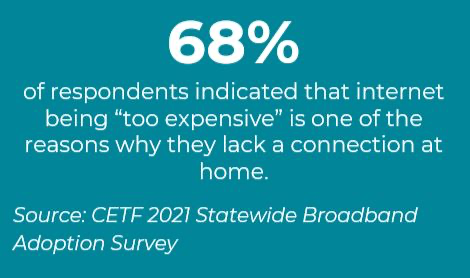
By Macy Meinhardt, Voice & Viewpoint Staff Writer
Starting in Mid-January, millions of low income Californians will get the notice that their internet access subsidy funded by the Affordable Connectivity Program will run out by mid-April. Consequently reinstating the barrier at the heart of the digital divide, internet cost.
Birthed as a result of growing internet inequities amid the depth of the pandemic, the Biden Administration under the Bipartisan Infrastructure law, funded a $14 billion dollar Affordable Connectivity program (ACP) to provide low-income households $30 per month off their internet bills and an additional $100 voucher to go towards a laptop or computer purchase. On qualifying tribal lands, this subsidy could go up to $75.
Since the program started, over 20 million American households have enrolled. Within San Diego County, almost two hundred households have enrolled, particularly concentrated within the unincorporated, central and southern parts of the county, according to the Institute of Self Reliance ACP dashboard.
However, without a funding renewal, the tap for the ACP program is in jeopardy of running dry, potentially requiring San Diegans, as well as residents across the state and country, to bear the full cost of their internet services.
Why this is important:
Internet Cost is at the heart of the digital divide. The digital divide represents the disparate gap between those who have ready access to the internet– and the leverage for personal and professional development it brings– versus those who do not have access. Internet inequities became pronounced during the COVID-19 pandemic, when societal activities were forced to go online amid global-wide lockdowns. For people unable to access affordable or accessible options, this barred rural, and lower income communities from accessing what advocates say is a “21st century civil right.”
“When we are talking about ACP running out we are not just talking about the numbers we are talking about real human people and their stories,” said Lauren Gaydes, a ACP advocate in regards to how internet loss will be detrimental to millions of Americans day to day lives.

According to studies produced by the California Emerging Technology Fund, 68% of statewide respondents stated that the internet being “too expensive” is one of the reasons why they lack a connection at home.
Digital Inequity Landscape In San Diego
Rural and tribal communities in San Diego often have less options when it comes to selecting internet service providers, and frequently have to select lower- quality services for higher costs. According to a SANDAG analysis of U.S. Census Bureau American Community Survey data, the City Heights (16%), San Ysidro (17%) and Barrio Logan/Logan Heights (21%) areas have high concentrations of households with low income that do not have internet subscriptions. In addition the report found that almost 1 in 10 San Diego County’s minority residents lack a computer and/ or internet subscription.
In response to this, SANDAG passed a resolution back in 2021 to take several initiatives to close the digital divide. With a focus on digital equity, the county recognizes accessible internet access as a civil right, and seeks to ensure that all individuals, regardless of socio-economic status and geography, have equal opportunities to access and utilize digital tools and resources.
One of the primary programs featured in SANDAG’S GetConnected initiative is the Affordable Connectivity Program, and as of October 2023, the organization in support of the county has helped organize enrollment events, messaging to the public, and coordinated efforts between different organizations. Grants for outreach were awarded to the County’s Department of Homeless Solutions and Equitable Communities, as well as the San Diego Housing Commission. With such success in its enrollment and outreach efforts state wide, now digital equity advocates and ACP stakeholders are worried that consumers will feel the “rug pulled out from underneath them” after they take the steps to enroll, only to be cut off in a few months.
This not only endangers residents who are already vulnerable but also undermines their trust in such programs.
“We can’t in good conscience say ‘sure, we can get you signed up for this. but unfortunately, by the time you get everything settled, you’ll have the internet for a few months and then that rug will kind of get pulled out from under you,” said Ryan Johnson Senior Policy Counsel, Next Century Cities.
As a result, Johnson says that a lot of community based organizations are trying to prepare some of the more vulnerable residents in their communities to say, “now’s the time that you need to be able to start looking for either alternative service or a more affordable service.”
As of press time, the county nor the housing commission has confirmed any plans to prepare enrolled San Diegans that will lose their funding.
How Politics will Affect Funding
However, in a more broad national context, Lauren Gaydes, who is the Director at Glen Echo Group and worked for the GOP party on capitol hill, says that this a bipartisan supported initiative with political motivation given the upcoming election year; therefore it shouldn’t have too much difficulty getting passed for a renewal. “It’s not going to be good if in October a member of congress is doing a stump speech and someone gets up and raises their hand and says ‘well you took my internet away’”.
For the time being however, “unfortunately congress just has other stuff going on right now,” said Gaydes, however she remains hopeful that they will come through before funding is officially cut off.
V&V will continue to follow this story and provide updates on the status of the renewal in the new year.
Happy Holidays.


